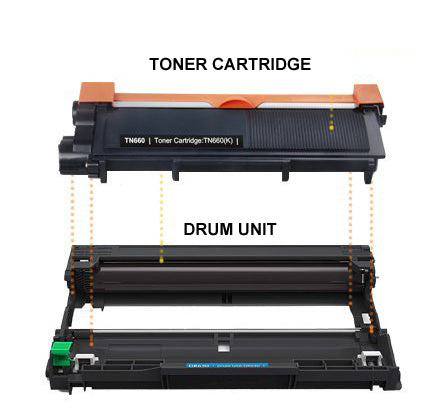
Toner Cartridge and Drum Unit
Share
Drum vs Toner:
Toner and drum units work together in a similar fashion. Toner is the paint, and the drum is the brush. You need both to do some painting...or printing.
But what’s the difference between a toner cartridge and a drum unit?
The Difference Between Toner and Drum
The imaging drum and the toner cartridge are arguably the two most important parts of a laser printer.
The laser in a laser printer eteches an electrically charged image onto the surface of the drum. Toner particles stick to the printer drum. The printing drum turns and transfers the toner — and image — to the paper.

What Is Printer Toner?
What is toner? What is the purpose of toner?
Printer toner is the dry powder found inside toner cartridges. The powder — made primarily of ground plastic — holds a negative charge, and the toner particles are drawn to the positively charged image imprinted on the printer drum.
Within the laser printing process, toner particles are transferred to the page via a change in electric charge. The entire laser printing process is centered around electric charges and the effect of the changes in electric charge on the toner particles, which are very receptive to changes in electric charges and are able to be moved by them.
The toner cartridge is a container that holds the toner powder particles that receive the electric charge. The photosensitive drum unit is an electrically charged cylinder that contains the image that is transferred onto the paper via an electric charge and is printed at a later stage in the process after going through the fuser which bakes the image onto the paper.
What Is A Printer Drum?
The drum unit on high volume printers looks like a big green cylinder. On other machines the drum is deep maroon in color and about the same size and width as a paper towel roll. Smaller laser printers can have a drum no wider than a pencil.
Regardless of size and color, the primary function of the drum unit is to attract the toner powder particles via electrostatic polarities and transfer the toner to the paper.
While the drum receives the electric charge and the image is drawn, the rest of the drum unit stays neutral.
A drum uses an electrostatic charge to attract the toner powder particles which are put on a photosensitive roller inside the drum unit. The electrostatic charge is then used to draw the image on the drum that is transferred onto the paper and printed on the page later in the process.
This is why drum units are commonly referred to as image drums or imaging units.
Which Type Of Printer Uses An Imaging Drum?
In most laser printers, the drum and toner are housed in a single cartridge. However, in some machines the two units are separate.
The advantage here is you can replace toner without having to replace a printer image unit, and vice versa.
You can replace toner cartridges three or four times before you need to replace an imaging unit or drum.
Many models of Brother laser printers have separate Toner Cartridge and Drum Units.
The Brother printer drum comes in a separate cartridge that snaps together with the toner cartridge to form one unit.
Brother printer drum units and Brother copier drums can be cleaned and replaced as needed. Brother laser printer drum life depends on how frequently you print. Other printer manufacturers that use a separate toner and drum configuration include Epson, OKI and Panasonic.
Which brands of laser printers have drums built in toner cartridges?
HP laser printers usually have the HP imaging drum built into the HP Toner Cartridge so when you replace one, you automatically replace the other.
When Do You Replace a Toner Cartridge And A Drum Unit?
When toner runs out, your prints will either be blank, inconsistent, or too light.
What happens when a printer drum goes bad?
When the drum wears out, you’ll begin seeing lines or faults repeated across the page. Replace the drum unit when you get white lines on your pages.
How Long Does A Laser Printer Drum Last?
The answer depends on how often you print. In general, a printer drum lasts about three or four times longer than your toner cartridges.
That’s why all-in-one cartridges are a bit of a waste; you’re tossing out a drum unit that’s still got plenty of life left in it every time you replace a toner cartridge.
Which is better: separate toner and drum cartridges or all-in-one cartridges?
From an environmental standpoint, separate toner cartridges and drum units are better. After all, there’s no reason to toss perfectly good drum rollers into landfills every time you need to replace your toner.
From an economic standpoint, separate toner cartridges and drum units are also a better bet. Toner-only cartridges are far less expensive than all-in-one units, and can be replaced three or four times before you need to replace a drum unit. This might save a few bucks in the long run.
Toner cartridges that contain a drum unit typically are more expensive than toner cartridges that do not. The reason for this is pretty self-explanatory — you are receiving two separate parts within one component.
From a practical standpoint, overall running costs for printers using all-in-one cartridges and printers using separate toner cartridges and drum units are about the same.
Image and text quality is excellent using either printing method. Some may prefer the convenience and reliability of all-in-one cartridges, arguing that having two components instead of one doubles the chances of potential malfunctions.
The truth is, both formats work great, all-in-one cartridges as well as separate toner and drum units.
What’s important is that your toner and drum work together in perfect, synchronized harmony, regardless of whether they’re housed in the same plastic casing, or two separate ones.
